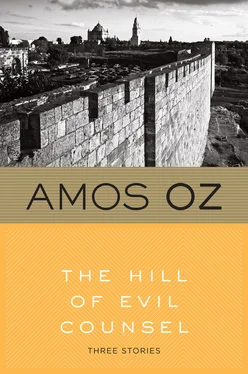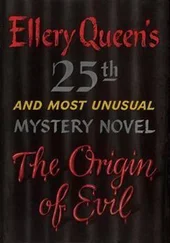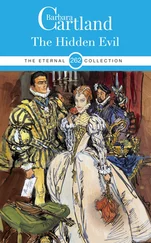Amos Oz - The Hill of Evil Counsel
Здесь есть возможность читать онлайн «Amos Oz - The Hill of Evil Counsel» весь текст электронной книги совершенно бесплатно (целиком полную версию без сокращений). В некоторых случаях можно слушать аудио, скачать через торрент в формате fb2 и присутствует краткое содержание. Год выпуска: 1991, Издательство: Mariner Books, Жанр: Современная проза, на английском языке. Описание произведения, (предисловие) а так же отзывы посетителей доступны на портале библиотеки ЛибКат.
- Название:The Hill of Evil Counsel
- Автор:
- Издательство:Mariner Books
- Жанр:
- Год:1991
- ISBN:нет данных
- Рейтинг книги:5 / 5. Голосов: 1
-
Избранное:Добавить в избранное
- Отзывы:
-
Ваша оценка:
- 100
- 1
- 2
- 3
- 4
- 5
The Hill of Evil Counsel: краткое содержание, описание и аннотация
Предлагаем к чтению аннотацию, описание, краткое содержание или предисловие (зависит от того, что написал сам автор книги «The Hill of Evil Counsel»). Если вы не нашли необходимую информацию о книге — напишите в комментариях, мы постараемся отыскать её.
Three stories in which history and imagination intertwine to re-create the world of Jerusalem during the last days of the British Mandate. Refugees drawn to Jerusalem in search of safety are confronted by activists relentlessly preparing for an uprising, oblivious to the risks. Meanwhile, a wife abandons her husband, and a dying man longs for his departed lover. Among these characters lives a boy named Uri, a friend and confidant of several conspirators who love and humor him as he weaves in and out of all three stories.
is "as complex, vivid, and uncompromising as Jerusalem itself" (
).
The Hill of Evil Counsel — читать онлайн бесплатно полную книгу (весь текст) целиком
Ниже представлен текст книги, разбитый по страницам. Система сохранения места последней прочитанной страницы, позволяет с удобством читать онлайн бесплатно книгу «The Hill of Evil Counsel», без необходимости каждый раз заново искать на чём Вы остановились. Поставьте закладку, и сможете в любой момент перейти на страницу, на которой закончили чтение.
Интервал:
Закладка:
Father said:
"That will do, Ruth. The boy can hear you; he understands almost everything."
She drew the child violently toward her, pressed his head against her, and covered his face with rough kisses. Then she said quietly:
"Yes, you're quite right. You've already forgiven me, Hans. The red taxi will be here soon, and we'll go to the ball. Stand still, Hans, while I tie your silly bow tie for you. I've really got no complaint against Buber and the rest of them. There, now you've remembered how to smile. At last. Why are you smiling?" Father said nothing.
9
Mitya had left his kibbutz in the Jezreel Valley because of an ideological argument at the end of the week in which Hitler had captured Warsaw. At the same time, he had also suddenly inherited some jewelry from his only relation, a forgotten aunt who had died in Johannesburg.
He had hastily sold the jewelry to a crafty Armenian goldsmith in the Old City and decided to settle in Jerusalem to study, with the aim of proving once and for all that the natives of Palestine were descended from the ancient Hebrews. He tried to produce conclusive proof that all the Arabs, nomads and peasants alike, were simply Israelites who had been forcibly converted to Islam and whom it was our duty now to rescue. Their clothes, the shape of their skulls, the names of their villages, their eating habits, and their forms of worship all bore abundant witness, he claimed, to the truth that the Jewish Agency was trying to hush up. But they could not pull the wool over his eyes.
For a pioneer, he was a skinny lad, with drooping shoulders and abrupt gestures. He was an uncompromising vegetarian, who called meat eating "the source of all impurity." His hair was thin, fair, almost white. When Mitya stood by himself in the kitchen making tea in his glass with its ring of worn gold paint, Hillel would sometimes observe a lonely, fanatical glint in his eye. His birdlike profile looked as though he were forever suppressing a sneeze. And he would chew the points of his shirt collar with his rotten teeth.
On his arrival, he had paid Father two years' rent in advance, and was given permission to look over the headlines in the daily newspaper and to use the typewriter occasionally. Once he typed out with two fingers an "Epistle to Those Who Are at Ease in Zion," in which he voiced various complaints and sounded a prophecy of doom. But the newspapers all either rejected his letter or simply ignored it. And once he hinted to Father that since the Babylonian Beasts had murdered the heroic Abraham Stern, code-named "Yair," he himself had become the secret commander of the Fighters for the Freedom of Israel. Father did not believe this any more than he believed Engineer Brzezinski, who said that Mitya was a dangerous Communist agent in disguise.
Mitya was ruthlessly clean and tidy.
Whenever he had finished in the lavatory, he would produce a small can inscribed in English, "Baby's Delight," and sprinkle the seat with perfumed talcum powder. When he had read the newspaper he would fold it neatly in four and place it carefully on the end of the bookshelf. If ever he met anyone as he came out of the bathroom or the lavatory (which he called "the throne room"), he would turn pale and mutter an embarrassed apology. He cleaned and scrubbed his own room twice a day.
Despite all this, a faint yet repulsive smell, like that of old cooking fat, always accompanied him in the corridor and escaped from under his door; it even clung to his glass with the worn gold ring.
No one was allowed into his room.
He had fitted a double Yale lock onto his door, and he always locked it even when he only went to wash. Sometimes he would cry out in his sleep in the early hours of the morning. In Russian.
***
During the summer months, Mitya would set off on foot in the direction of Mount Scopus, crossing hills and valleys with his disjointed gait, spurning roads and paths, advancing in a line straight as an arrow in flight. He would traverse the suburb of Sanhedriya like a hurricane, skirting the police training school, with his birdlike head thrust forward, a distant look in his eye, and finally, panting but undeterred, he would emerge into the district of Sheikh Jarrah, where he would always break his journey to drink his morning coffee among mustached, kaffiyeh-wrapped Arabs, with whom he attempted persistently to enter into conversation, but without success, since he could speak only classical Arabic, and that with a heavy Russian accent. The Arab coffee-drinkers nicknamed him al-Hudhud, "the hoopoe," perhaps because of his crest of thinning hair.
He would spend whole days on end in the basement of the national library on Mount Scopus, endlessly covering little cards with feverish notes. When he came home in the evening, he would sometimes bare his rotting teeth in a grin and pronounce some cryptic prophecy:
"I promise you that tonight a mighty explosion shall resound. The mountains shall drop sweet wine, and all the hills shall melt."
Because those were eventful days, his prophecies sometimes came true in a way. Then Mitya would smile modestly, like a humble artist who has won a prize with one of his works.
During the last year of the World War, Hillel peeped through the keyhole and discovered that Mitya had huge maps hanging on all the walls of his room, from the ceiling almost to the floor. He had other maps spread out on his desk, on his bed, and on the straw matting. These maps were covered with thick black and red arrows, flags, buttons, and matchsticks.
"Daddy, is Uncle Mitya a spy?"
"That sort of foolishness is beneath your dignity, Hillel."
"Then why is he like that? Why has he got maps in his room, and arrows?"
"You're the spy, Hillel. You spied on Uncle Mitya. That's not a nice thing to do, and you'll promise me right now that you won't do it again."
"I promise, but…"
"You've promised. Now that's the end of it. It's wrong to talk about people behind their backs."
One day in 1944, Mitya proposed to Father that the British fleet should storm up the Bosporus and through the Dardanelles "like a rod of anger," gain mastery over the Black Sea, ravage half of the Crimea with fire, land "myriads of armies" all along the Slavic coasts, knock the heads of the two tyrants together, "and grind to dust the dragon and the crocodile of Egypt." Father considered this utterance in silence, proffered a mild, sympathetic smile, and remarked that the Russians were now on the side of the Allies.
"You are the generation of the wilderness. You are the seed of slaves," Mitya replied vehemently. "You have all been stricken with blindness. Chamberlains. Arlosoroffs. Gandhis. Plebeians. Eunuchs. I don't mean you personally, Dr. Kipnis, heaven forbid! I was speaking in the plural; you in general. I can see from your wife's eyes that she agrees with me deep in her heart, but because she is wise and sensitive she prefers to remain silent, and of course she is quite right. Surely no remnant shall remain of all the eunuchs. When they cry with upraised voice and outstretched throat 'eternal people,' 'forever and ever,' 'Jerusalem, the eternal city,' surely every stone of Jerusalem bursts out laughing. Now I must beg your pardon and bid you good night. I'm sorry; good night."
Once, when Father was out working in the villages and Mother was at the hairdresser's, Mitya trapped Hillel at the dark end of the corridor and addressed his fevered utterances to him:
"We who have returned to Zion, and especially your generation, whose souls have not been perverted by exile, have an obligation to make children by force by the women of the fellahin. We must give them children who look like you.
Masses of fair-haired children. Strong and fair and fearless. It's a matter of life and death. A new breed, thoroughbred, lusty steppe-wolves instead of namby-pamby scholars. The old eunuchs will die off. Blessed are you, for you shall inherit the earth. Then a flame shall issue forth from Judah and consume Perfidious Albion. What could be easier. We know how they go out alone at night to gather firewood. They wear long dark dresses down to their ankles, but underneath their dresses they have nothing on at all. They must be conquered and mounted by main force. With holy zeal. They have women who are dark and hairy as goats, and we have rods of fire. We must spill fresh blood, dark, warm blood. Your parents may call you Hillel, but I shall call you Ithamar. Listen to me, young Ithamar. You are a new recruit: I order you to learn to ride a horse, to use a dagger, to toughen yourself up. Here, take a biscuit: you can't refuse, I'm your commanding officer. This'll all be a closely guarded secret between the two of us: the Underground has no pity on traitors and informers. Who is this that cometh from Seir, with dyed garments from Edom? It is you and the rest of your generation. Nimrods, Gideons, Jephthahs, all of them skilled men of war. You shall see and behold with your own eyes, O new recruit Ithamar, the whole British Empire brought down into the dust like a rag doll. The Inheritor shall come marching from the east. He shall ascend the mountain and discomfit the plain with an iron hand until those lascivious, black hairy she-goats of the fellahin scream at us in terror and delight. Lascivious she-goats! Now, take this shilling and run and buy yourself a mountain of chewing gum. It's yours. Yes. From me. Never disobey orders. Now, scram!"
Читать дальшеИнтервал:
Закладка:
Похожие книги на «The Hill of Evil Counsel»
Представляем Вашему вниманию похожие книги на «The Hill of Evil Counsel» списком для выбора. Мы отобрали схожую по названию и смыслу литературу в надежде предоставить читателям больше вариантов отыскать новые, интересные, ещё непрочитанные произведения.
Обсуждение, отзывы о книге «The Hill of Evil Counsel» и просто собственные мнения читателей. Оставьте ваши комментарии, напишите, что Вы думаете о произведении, его смысле или главных героях. Укажите что конкретно понравилось, а что нет, и почему Вы так считаете.











